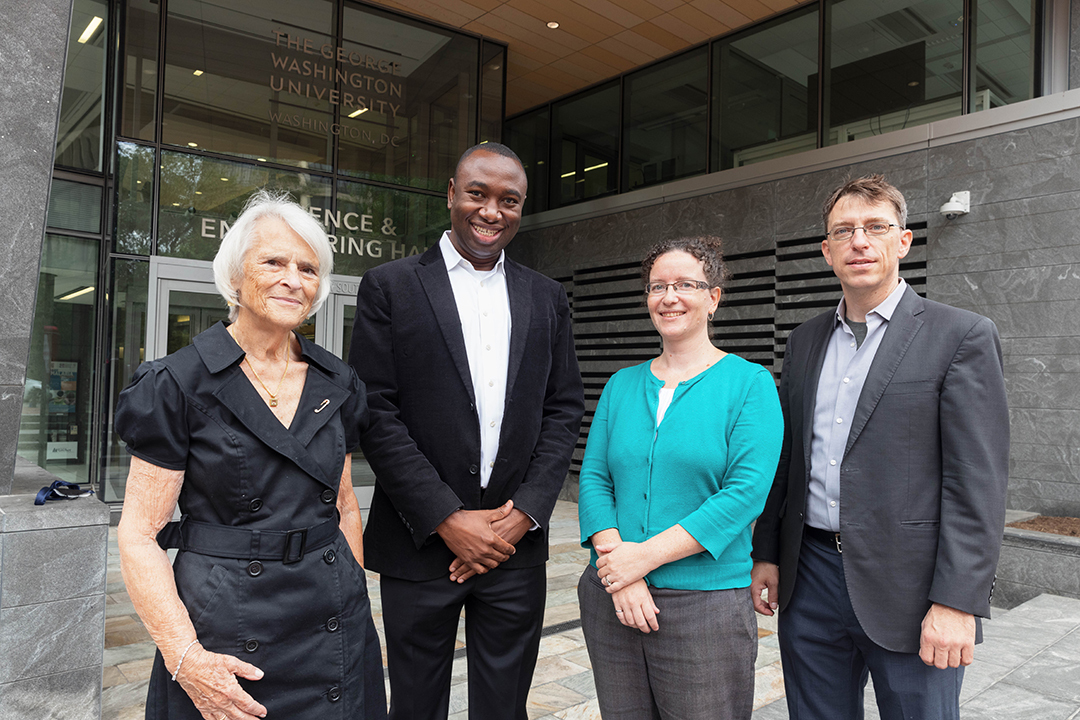By Kristen Mitchell
The George Washington University School of Engineering and Applied Science (SEAS) received a $3 million award from the National Science Foundation to develop a transformative model for graduate education training that combines research in computer science and systems engineering to support the next generation of leaders and researchers in artificial intelligence (AI).
This new initiative marks the first time the university has been the primary institution on an award from the prestigious NSF Research Traineeship (NRT) Program. It brings together faculty from the SEAS Department of Engineering Management and Systems Engineering (EMSE) and the Department of Computer Science (CS), who will support 25 Ph.D. students over the next five years, develop a new graduate certificate program for mid-career professionals working with AI and host boot camps and seminars open to the GW community.
Over the past decade, AI tools have been developed at an unusually rapid pace. They’ve been deployed into environments where value maximization precedes regulation, the grant abstract states, and these tools impact every realm of life. Through this funding, GW will conduct research and educate interdisciplinary scholars capable of co-designing AI algorithms and work systems to unlock new opportunities in both the capabilities of new systems and their “trustworthiness.”
The designers of tomorrow must be able to take advantage of the power of AI while mitigating potential risks of embedding bias or cybersecurity threats, said Zoe Szajnfarber, principal investigator, professor and chair of EMSE. To do this, algorithm designers need to learn more about the complex systems in which AI will be deployed. AI adopters, including policymakers, also need to better understand the capabilities and limitations of these new technologies.
“We made the case that a new approach is needed to train a next generation of researchers who are able to think about both algorithm design and the system in which it will be deployed, well enough to bridge across those disciplines so that we can take full advantage of the opportunities to transform work for social good, while mitigating unintended consequences,” she said.
This funded project, titled “Co-Design of Trustworthy AI and Future Work Systems,” is led by Dr. Szajnfarber and co-principal investigators Robert Pless, computer science department chair and the Patrick and Donna Martin Professor of Computer Science, Rachelle Heller, director of the SEAS Center for Women in Engineering and professor emerita of computer science, and Ekundayo Shittu, EMSE associate professor. The project will engage many other faculty members through interdisciplinary research projects focused on application areas of existing strength, including humanitarian operations, the information landscape and smart mobility.
The NRT will build on existing Ph.D. programs, involving students who have a deep research area in either computer science or systems engineering. The goal is to bring these two fields together for meaningful, interdisciplinary interaction, Dr. Pless said.
“This project is a really good combination of a couple really deep technical disciplines of system engineering and computer science and AI,” Dr. Pless said. “It builds on some of the things that our strategic planning and our strategic research initiatives have been building towards for years.”
John Lach, dean of SEAS, said the NRT award to SEAS is a result of faculty leaders working across disciplines to create a compelling and distinctive vision for the future of graduate education.
“It’s in line with our school’s ‘engineering and...’ approach, which emphasizes the societal context in which engineering and computing are practiced,” Dr. Lach said. “This context—in addition to the program's technical depth and professional development—will prepare students to become leaders and cultivators of trust in our increasingly AI-driven world."
Compared to traditional engineering or computer science Ph.D. programs, students will engage in coursework with an emphasis on building holistic skills including communication, leadership, teamwork and ethics. The faculty is also focused on providing opportunities for students from diverse backgrounds. Bringing more diverse perspectives into AI decision-making can help mitigate bias within well-intended systems to ensure they are trustworthy, equitable and fair.
“The reality is a lot of the seeds of unintended consequences get baked in through early design decisions,” Dr. Szajnfarber said. “They're really hard to correct later, but if you can think through the implications upfront—a big if—design changes are much easier in the initial stages. To that end, including more diverse perspectives early in design is known to help with this identification process.”
The new graduate certificate program—yet to be named—is expected to launch ahead of the fall 2022 semester. That program will be aimed toward working professionals who are asked to evaluate or integrate new technologies into organizations and critical decision functions to help them gain a stronger fundamental understanding of algorithm design to be more informed consumers and purchasers.
Certificate students and Ph.D. students will interact closely through seminars that aim to explore new cross-cutting ideas through discussions and case studies with external industry experts and faculty. This provides an important path for doctoral students to learn of the most pressing problems in practice, and mid-career professionals to gain access to the latest tools and insights, a type of cross pollination particularly enabled by GW’s Washington, D.C location. The seminar series, focused on trustworthiness in AI, is set to launch by next September.
This NRT award joins a list of prestigious research training awards the university has received recently. Over the past year, the School of Medicine and Health Sciences has been awarded three T32 Ruth L. Kirschstein National Research Service Award institutional research training grants from the Health Resources and Services Administration. The first to study cancer, the second to study HIV and the third in primary care research team development.





